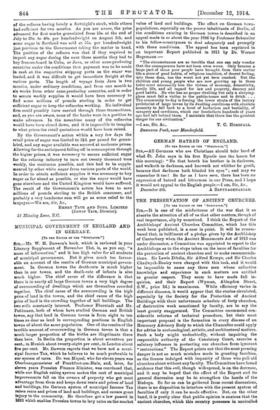MUNICIPAL GOVERNMENT IN ENGLAND AND IN GERMANY.
[To TER EDITOR OF THY "SPECTATOR."]
Stu,-11r. W. H. Dawson's book, which is reviewed in your Literary Supplement of November 21st, is, as you say, "a mass of information," and it has high value for all students of municipal government. But it gives much too favour- able an account of the results of German municipal govern- ment. In German towns the death-rate is much higher than in our towns, and the death-rate of infants is also much higher. The chief cause of the difference is that there is in nearly all large German towns a very high degree of overcrowding of dwellings which are themselves crowded together. The chief cause of the overcrowding is the high price of land in the towns, and the chief cause of the high pr ice of land is the crowding together of tall buildings. The two evils constantly interact. Professor Eberstadt and Mr. Pohlmann, both of whom have studied German and British towns, say that land in German towns is from eight to ten times as dear as land in corresponding positions in English towns of about the same population. One of the results of the terrible amount of overcrowding in German towns is that a much larger proportion of the births are illegitimate there than here. In Berlin the proportion is about seventeen per cent., in Munich about twenty-eight per cent., in London about five per cent. Mr. Dawson regrets that we have not a muni- cipal Income Tax, which he believes to be much preferable to cur system of rates. Dr. von Miguel, who for eleven years was Oberbuergermeister of Frankfurt-am-Main, and, later, for eleven years Prussian Finance Minister, was convinced that, while our English rating system makes the cost of municipal improvements fall on the owners of property who get most advantage from them and keeps down rents and prices of land and buildings, the German system of municipal Income Tax raises rents and prices of land and buildings, and causes great injury to the community. He therefore got a law passed in 1893 which enables Prussian towns to levy rates on the market
value of land and buildings. The effect on German town- populations, especially on the poorer inhabitants of Berlin, of the conditions existing in German towns is described in an appeal made in or about the year 1886 by Professor Schmoller to his fellow-countrymen to deal adequately and promptly with those conditions. The appeal has been reprinted in an important Report published in 1911 by Dr. Werner Hegemann The circumstances are so terrible that one can only wonder that the consequences have not been even worse. Only because a large part of these poor people have brought from their earlier life a store of good habits, of religious tradition, of decent feeling, into these dens, has the worst not yet been reached. But the children and young people who are now growing up in these holes must necessarily lose the virtues of economy, domesticity, family life, and all regard for law and property, decency and good habits. He who has no proper dwelling but only a sleeping- place must fall a victim to the public-house and to drink. . . . The community to-day is forcing the lower strata of the factory proletariat of large towns by its dwelling conditions with absolute necessity to fall back to a level of barbarism and bestiality, of savagery and rowdiness, which our forefathers hundreds of years ago had left behind them. I maintain that there lies the greatest danger for our civilization."
—I am, Sir, &c., T. C. HORSFALL.
Swanscoe Park, near Macclesfield.














































 Previous page
Previous page